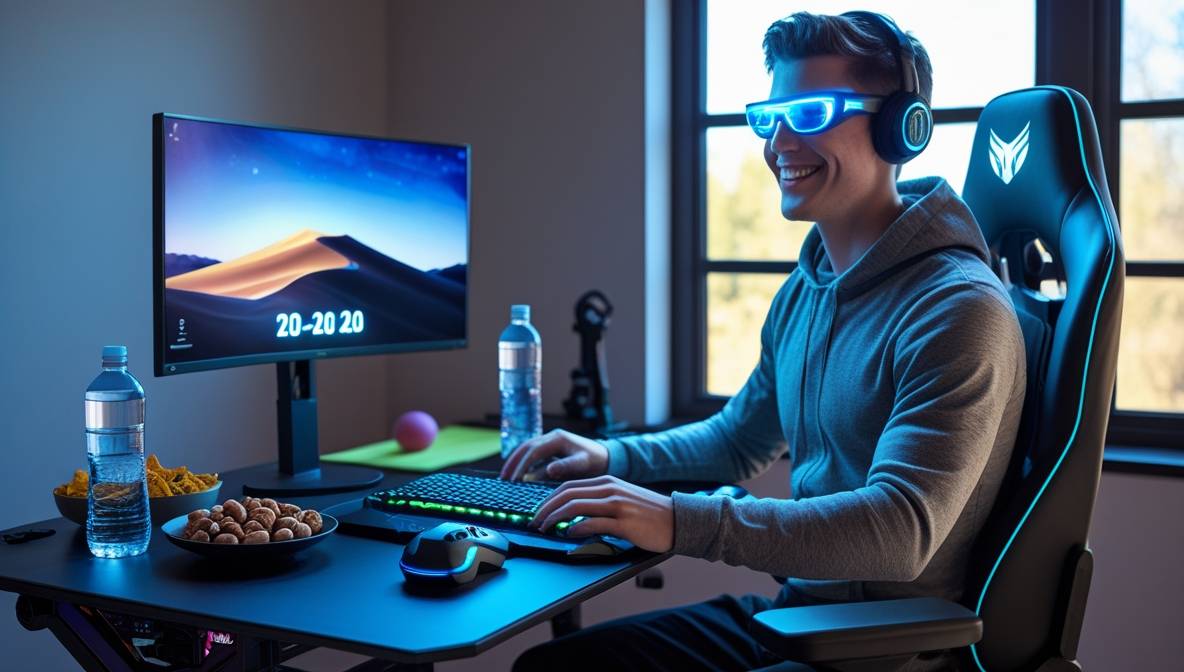Gaming marathons don’t have to wreck your health. At VipGame24, we’ve compiled science-backed strategies to keep you physically fit, mentally sharp, and injury-free—even during 12-hour sessions.
Why Gaming Health Matters
- 57% of gamers report wrist pain or eye strain (CDC).
- Prolonged sitting increases risks of obesity and cardiovascular issues.
- Blue light exposure disrupts sleep cycles, affecting reaction times.
Balance is key. Use these tips to game smarter, not harder.
Step 1: Optimize Your Ergonomic Setup
Ergonomic Essentials Checklist
| Equipment | Ideal Specs | Budget Pick |
|---|---|---|
| Chair | Adjustable lumbar support, armrests | Hbada Ergonomic ($200) |
| Desk | Height-adjustable (28–30″) | FlexiSpot EC1 ($250) |
| Monitor | 24–27”, 20–30” from eyes | ASUS TUF Gaming VG249Q ($180) |
| Keyboard/Mouse | Wrist rest, vertical mouse | Logitech MX Vertical ($100) |
Pro Tips:
- Position monitor top at eye level to prevent neck strain.
- Use a footrest if feet don’t touch the floor.
- For DIY setups, see our gaming PC building guide.
Step 2: Movement Breaks & Exercises
The 60-20-5 Rule
- Every 60 minutes, take a 20-minute break.
- During breaks, do 5 minutes of exercise:
- Wrist stretches: Rotate fists clockwise/counterclockwise.
- Neck rolls: Tilt head side-to-side for 30 seconds.
- Squats or jumping jacks: Boost circulation.
Bonus: Use apps like Stand Up! to schedule breaks.
Step 3: Diet & Hydration for Gamers
Gamer-Friendly Snacks
| Snack | Benefit | Avoid |
|---|---|---|
| Almonds | Protein for focus | Energy drinks (high caffeine) |
| Blueberries | Antioxidants for eye health | Chips (empty calories) |
| Dark chocolate | Improves mood | Sugary sodas |
Hydration Hack: Keep a 1L water bottle nearby—sip 250ml hourly.
Meal Prep Ideas
- Pre-game: Oatmeal + banana (slow-release carbs).
- Mid-session: Turkey wrap + veggies (protein + fiber).
- Post-game: Salmon + quinoa (omega-3s for brain recovery).
Step 4: Protect Your Eyes & Mind
Screen Time Management
- Blue light glasses: Reduce eye strain (e.g., Gunnar Optiks).
- 20-20-20 rule: Every 20 minutes, stare at something 20ft away for 20 seconds.
- Night mode: Enable after 8 PM to minimize sleep disruption.
Mental Health Tips:
- Limit sessions to 3–4 hours max.
- Use Freedom app to block games during study/work hours.
- Join VipGame24’s Discord for peer support.
Step 5: Social Gaming & Community
Benefits of Multiplayer Games
- Reduces isolation: Team up in Fortnite or Among Us.
- Builds communication skills: Coordinate raids in Destiny 2.
- Find communities: Subreddits like r/GamerPals or VipGame24’s multiplayer list.
Warning: Avoid toxic lobbies—mute abusive players immediately.
Step 6: Balance Gaming with Life
Weekly Schedule Template
| Time | Activity |
|---|---|
| 6–7 AM | Jogging/Yoga |
| 7–8 PM | Gaming Session 1 (with breaks) |
| 10 PM | Wind down (no screens) |
Prioritization Tips:
- Use Eisenhower Matrix: Rank tasks as Urgent/Important.
- Set alarms for critical deadlines (e.g., work, exams).
Final Checklist for Healthy Gaming
- Ergonomic chair and desk setup.
- Hourly stretch breaks.
- Balanced meals + hydration.
- Blue light filters enabled.
- Daily outdoor time (30 mins minimum).
For more wellness strategies, explore VipGame24’s gaming wellness category.

